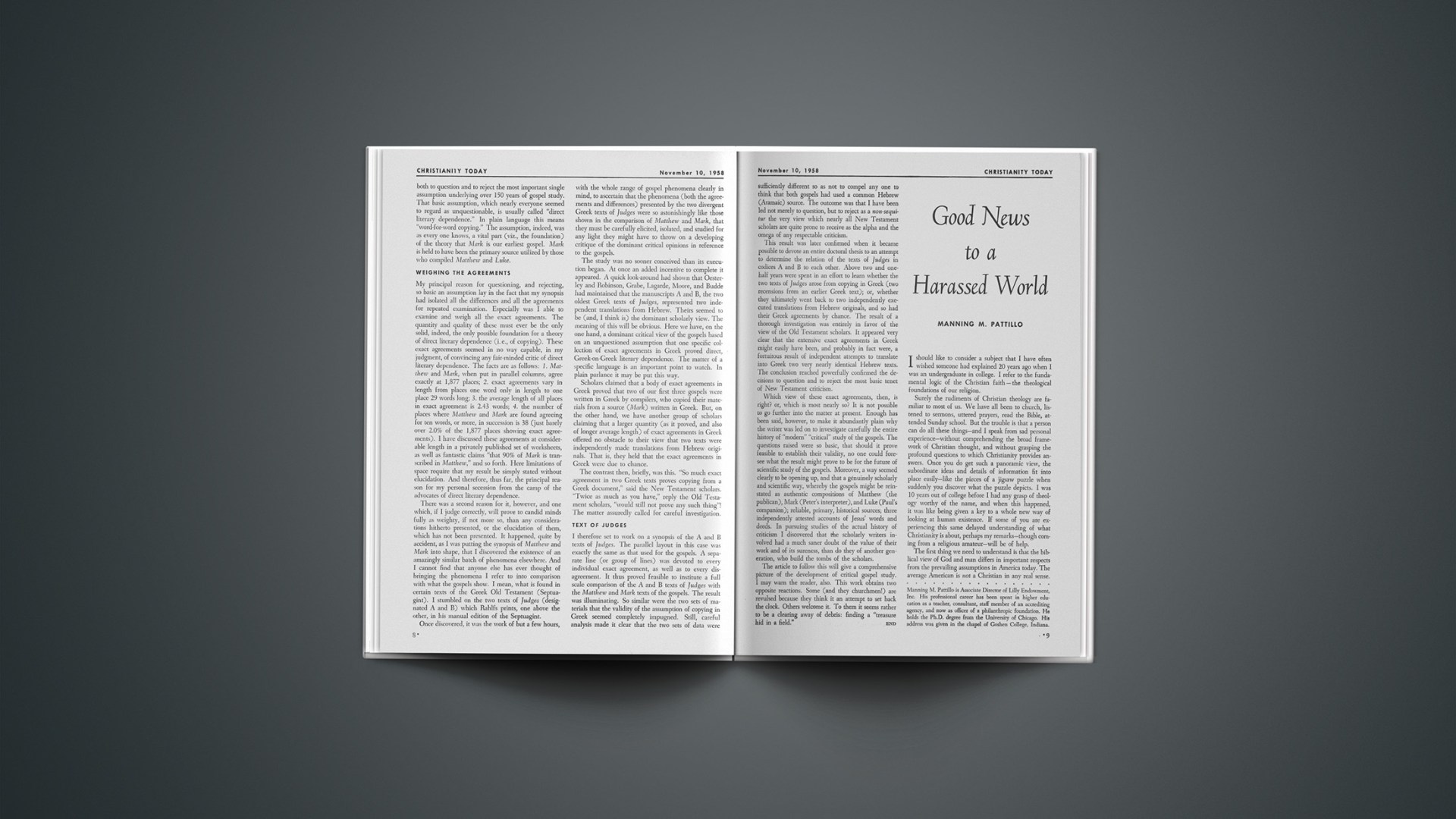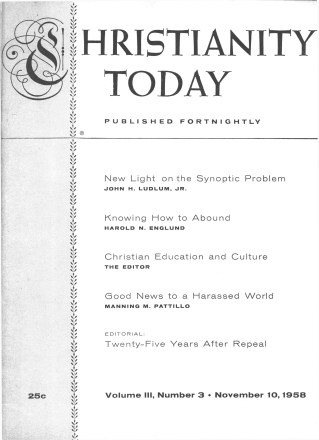I should like to consider a subject that I have often wished someone had explained 20 years ago when I was an undergraduate in college. I refer to the fundamental logic of the Christian faith—the theological foundations of our religion.
Surely the rudiments of Christian theology are familiar to most of us. We have all been to church, listened to sermons, uttered prayers, read the Bible, attended Sunday school. But the trouble is that a person can do all these things—and I speak from sad personal experience—without comprehending the broad framework of Christian thought, and without grasping the profound questions to which Christianity provides answers. Once you do get such a panoramic view, the subordinate ideas and details of information fit into place easily—like the pieces of a jigsaw puzzle when suddenly you discover what the puzzle depicts. I was 10 years out of college before I had any grasp of theology worthy of the name, and when this happened, it was like being given a key to a whole new way of looking at human existence. If some of you are experiencing this same delayed understanding of what Christianity is about, perhaps my remarks—though coming from a religious amateur—will be of help.
The first thing we need to understand is that the biblical view of God and man differs in important respects from the prevailing assumptions in America today. The average American is not a Christian in any real sense. Christianity is, and perhaps always has been, a minority religion; most of our contemporaries worship security or technology or a system of government or a set of ethical ideals or social evolution—all of which may be valuable, but are not to be confused with the living and acting God, the majestic God of the Old and New Testaments. When you are searching for ultimate value or truth, in religion or in any other field, you cannot afford to be guided simply by majority opinion.
Need For Discernment
From earliest times the actors in the biblical drama were aware of a divine will which imposed upon them a moral demand they could not meet. They always had a troubled conscience. God’s demand for complete righteousness and obedience could not be met by gifts or sacrifices of one’s property, however costly. The offering required by God was that of righteous acts—justice, mercy and purity. Sometimes the Hebrew prophets, seeing clearly that sacrifices of animals were unable to atone for human sin, spoke as if it were a simple matter for men to offer to God “the sacrifice of righteousness.” Micah, for example says in a famous passage (6:6–8):
Wherewith shall I come before the Lord, and bow myself before the high God? shall I come before him with burnt-offerings, with calves of a year old? Will the Lord be pleased with thousands of rams, or with ten thousands of rivers of oil? shall I give my firstborn for my transgression, the fruit of my body for the sin of my soul? He hath shewed thee, O man, what is good; and what doth the Lord require of thee, but to do justly, and to love mercy, and to walk humbly with thy God.
Micah was right in perceiving that this is indeed what the Lord requires, but the tragedy of human existence is that we cannot meet these requirements. How can we offer a righteousness to God which we do not possess? It is a simple fact of everyday experience that we cannot do what is right simply by trying hard. We always fall short of the mark. By our own efforts we cannot save ourselves from God’s verdict of “guilty.” The degree of righteousness we are able to attain is not good enough for God. All we can do is to offer God our regret that we have failed and our determination to do better next time.
To many modern ears this analysis of the problem of man’s relationship to God may sound quaint and strangely remote. Few people today think of offering sacrifices to God for the shameful things they do. This seems alien to the present-day way of looking at life. But modern man has not in fact extricated himself from the dilemma by changing the words and omitting references to the God who judges him. We know that we do make the wrong choices in our conduct, and as a result we are ashamed of ourselves and long to make up for our bad acts in some way.
Sin, or whatever you want to call it, has not been eliminated by our cultural and scientific progress since Old Testament times. Just look at the front page of any metropolitan newspaper. You can call violations of right conduct delinquency or crime or psychological maladjustment or anti-social behavior—in most instances the appropriate theological term would be sin, the breaking of God’s law. Then too, selfishness, infidelity, vanity, self-righteousness, hardness of heart, are written all over the morning newspaper and are as truly sin as the more spectacular crimes. The existence of sin, though an unpopular notion today, is a most obvious fact in the Christian faith.
New Testament religion begins at the same point at which the Old Testament arrives, namely, the recognition that no matter how hard we try to satisfy God’s demand for righteousness, it is not within our power. According to the New Testament, God himself offers on man’s behalf the sacrifice which man is unable and unworthy to offer. This is the meaning of the Cross. Christ, who is genuine God and genuine man, fulfills in our behalf the holy law before which we have stood condemned. Because he is God he can do what we cannot do; in his life on earth he met completely the moral standards of God. If we have faith in Jesus Christ, God accepts Christ’s righteousness as if it were ours; or, to state it in another way, we participate in the righteousness of Christ by faith in him. If we believe in him, he shares his righteousness with us, and we can offer it to God in place of our own unrighteousness. This is the very heart of the Gospel, the Good News. In theological language, it is the doctrine of justification by faith. Unless you understand this point, Christianity is meaningless.
Power Of Faith
Faith in Christ has the power which all our own efforts could not have to save us. This is what we mean when we say that Christ is our Saviour. The clearest statement of the doctrine is probably to be found in chapter five of Paul’s letter to the Christians at Rome. It was God’s action, the free gift of his love, not something that we ourselves had achieved, which accomplished our salvation. Salvation is our reconciliation to God—the doing away of the consequences of sin.
Bear in mind that these things were accomplished through historic events. Jesus Christ actually lived in a particular geographical area in a particular period of time. He was actually crucified during the administration of Pontius Pilate, was buried in a specific tomb, rose from the dead on a particular day, and was seen again by a considerable number of men and women who knew him personally. These events are the very stuff of Christianity. These are the facts upon which our faith is based. Christianity is not primarily a body of philosophical abstractions or a code of rules. It is essentially an historical religion. If you study the great statements of Christian belief, such as the Apostles’ Creed, you will find that they are in large part a chronicling of events that happened in history.
The Christian’S Response
The response of the Christian, when he understands the full meaning of this redemption and the bounty of God’s grace in offering it, is a profound and transforming thankfulness to God for his invaluable gift. And so the real motive for Christian conduct is not a stoic submission to a stern law of duty, but the grateful response of a love that is awakened in our hearts by the freely offered love of God. That which we could not earn has been given to us. The driving power of Christian ethics is gratitude to God for his gift of Christ. The law which we were unable to keep through our own efforts, and which had caused in us a corrosive sense of guilt, is now a source of joy. It becomes a means for us to express our gratitude. We still cannot keep it perfectly, of course, but there is now no condemnation to them who are in Christ Jesus, as Paul says. Obedience is no longer the duty of slaves; it is now the privilege of sons. Our behavior comes closer to God’s purposes for us.
For people who will face realistically the moral dilemma of mankind, of you and me here and now, this is indeed good news. It is the good news that swept across the world in the early days of the Christian Church, and that changed timid and vacillating men into militant evangelists and unflinching martyrs in the face of persecution by the strongest police-state history had known. It is good news to a harassed world today.
The matter has been stated succinctly in a time-honored prayer known as the General Thanksgiving: Almighty God, Father of all mercies, we, thine unworthy servants, do give thee most humble and hearty thanks for all thy goodness and loving-kindness to us, and to all men; we bless thee for our creation, preservation, and all the blessings of this life; but above all, for thine inestimable love in the redemption of the world by our Lord Jesus Christ; for the means of grace, and for the hope of glory. And, we beseech thee, give us that due sense of all thy mercies, that our hearts may be unfeignedly thankful; and that we show forth thy praise, not only with our lips, but in our lives, by giving up our selves to thy service, and by walking before thee in holiness and righteousness all our days; through Jesus Christ our Lord, to whom, with thee and the Holy Ghost, be all honour and glory, world without end. Amen.
END
Manning M. Pattillo is Associate Director of Lilly Endowment, Inc. His professional career has been spent in higher education as a teacher, consultant, staff member of an accrediting agency, and now as officer of a philanthropic foundation. He holds the Ph.D. degree from the University of Chicago. His address was given in the chapel of Goshen College, Indiana.










